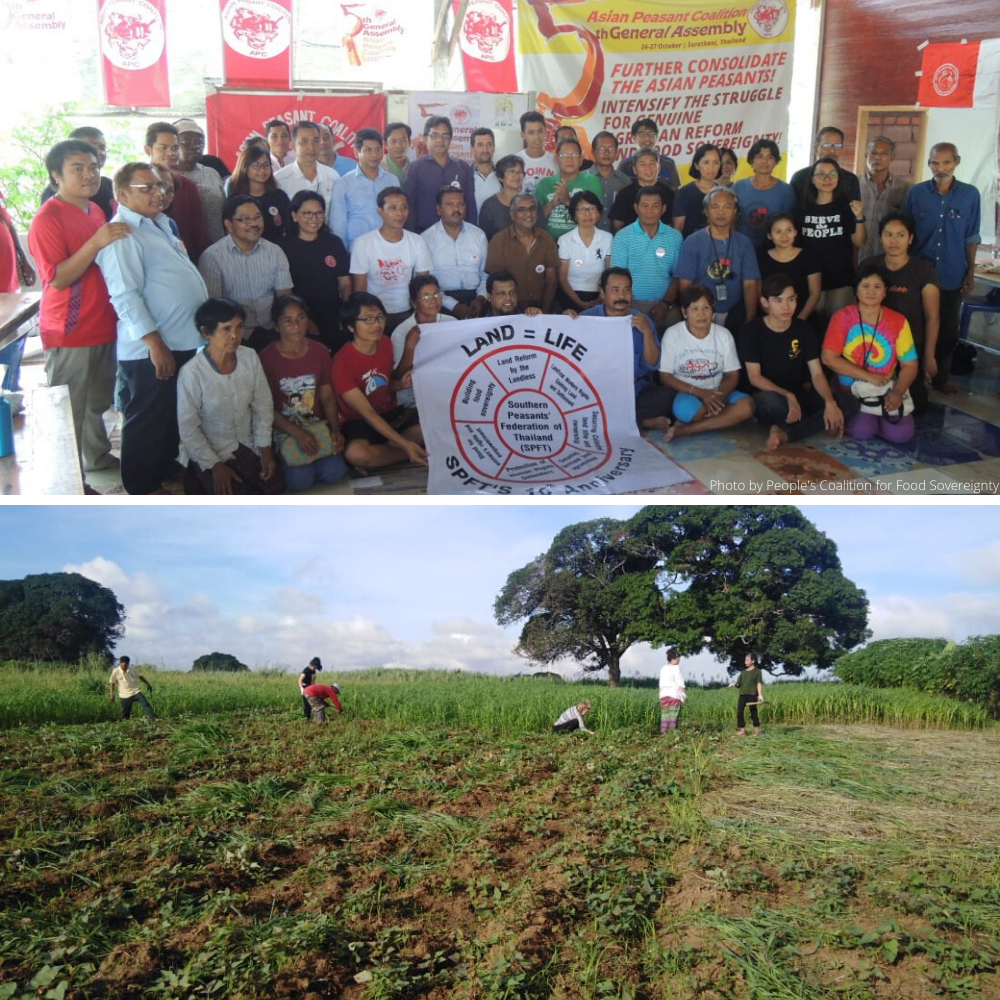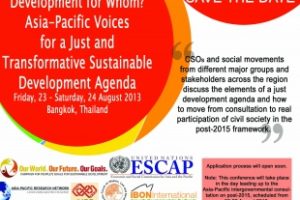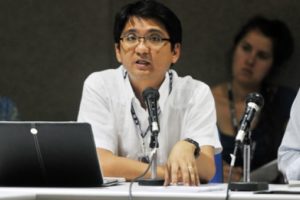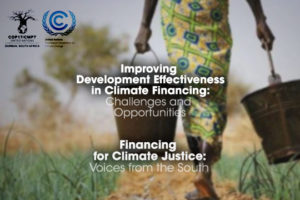This document is a submission of IBON International to the 2020 High Level Political Forum (HLPF) call for major groups and other relevant stakeholders to report on their contribution to the implementation of the 2030 Agenda (according to paragraph 89 of UN General Assembly Resolution 67/290). IBON International focused on its contribution towards sustainable and people-centered economies through its work themes on: Rights-based democracy, Climate Justice, People-centered Trade and Development for the people; as well as provided comments and recommendations to the Global Sustainable Development Report (GSDR) Entry point 2 on sustainable and just economies.
IBON’s Strategic Plan for 2016 to 2020 broadly aims to develop people’s capacity for independent action and engagement through building leadership, organization, and sustaining mobilization of civil society organizations (CSOs) and social movements to exercise their sovereign will, and through enabling meaningful interface and engagement toward an enabling state and economic democracy. In the course of implementing its strategic plan, IBON International has contributed towards the achievement of sustainable and people-centered economies.
The fundamental importance of people’s participation in decision-making for sustainable development was recognized in the UNGA Resolution 66/288 (The Future We Want). Likewise, civil society’s participation in sustainable development was also reaffirmed several times in the same document.
As the implementation of the Agenda 2030 and the Sustainable Development Goals (SDGs) hits its fifth-year mark, IBON International emphasizes that people’s democratic participation still remains central to the achievement of sustainable development, and is essential in any effort towards acceleration in the next 10 years.
IBON International’s Contribution towards Sustainable and People-Centered Economies
IBON International firmly believes that an integrated approach is key to the achievement of sustainable development in general, and sustainable and people-centered economies in particular.
While the organization’s work on capacity development is directly related to SDG 16.6. (Develop effective, accountable and transparent institutions at all levels) and SDG16.7 in general (Ensure responsive, inclusive, participatory and representative decision-making at all levels), the organization also contributed to the implementation of SDGs 12, 13, and 17 through focusing on building the capacity of CSOs and social movements for independent action and engagement of policy-making bodies on sustainable consumption and production, climate change, financing for development, trade and investments, and global partnerships.
Advancing Rights-Based Democracy, People-Powered Democracy (RBD/PPD)
IBON International’s program theme on Rights-Based Democracy/People-Powered Democracy
(RBD/PPD) directly responds to Goal 16 of the SDGs. However, it cuts through all the implementation of the goals as it looks at the three dimensions of sustainable development–economy, environment and society–from the lens of human rights, and further, the collective assertion of peoples’ rights and exercise of sovereignty.
In 2016, the organization launched the People’s Rights Seminars which underscored the concepts of collective rights, people’s rights, people’s sovereignty, and democracy for people’s organizations (POs) in the pursuit of genuine sustainable development in the Philippines. In 2017 and 2018, the People’s Rights seminars were held with partners among people’s organizations, trade unions, women’s organizations, and church organizations in the Philippines, Indonesia, Thailand, Senegal, and Zambia. Topics on labor rights, decent work, women’s rights, and movement building were given special attention in these discussions. By the end of 2018, more than 500 leaders from grassroots people’s organizations and NGOs, from 19 countries in Africa and Asia were able to participate in these workshops. The workshops on RBD/PPD were accompanied with dialogues between the CSOs and POs on the one hand, and local authorities, parliamentarians, and private sector on the other. In the Philippines for example, IBON International facilitated an interface in Caloocan City between CSOs/POs and local authorities, taking on the issue of drug-related arrests and killings as well as demolitions of urban poor communities. Another was done in Iloilo City between CSOs/POs and government agencies on issues of agrarian reform, social welfare, and free, prior and informed consent.
Among the impacts of the program are the development of CSOs’ and POs’ existing capacities to assert their rights on issues of governance and development, towards holding state actors into account as duty bearers. State actors were obligated to act on their duties in recognition of people’s democratic rights, using human rights-based approaches.
Claiming Climate Justice
From 2016 to 2018, IBON International conducted climate change workshops and seminars that aimed to develop capacities of civil society organizations and their constituents, particularly those from marginalized sectors and communities to engage and strive to influence country positions at the international climate negotiations, as well as feed into national policy and development planning. Training modules on Climate Justice were developed, which provided information on the science and impacts of climate change, and also laid the ground for analyzing the dominant economic system, how it drives the climate crisis, and how corporations and the elite continue to profit from it. The modules included discussions on climate finance and the role of different stakeholders in the climate negotiations.
Workshops were conducted in the Philippines, Indonesia, Bolivia, Senegal, and Kenya.
The organization also led delegations to the Conference of Parties 22, 23, 24 and 25, composed of its partners from the Global South, in order to engage policy makers at the United Nations Framework Convention on Climate Change (UNFCCC), and to build stronger community and linkages with other organizations dedicated to advocating climate justice. IBON International was active both inside the UNFCCC meetings, as well as in the CSO-organized People’s Climate Summits wherein the organization and its partners called on governments and other actors to address environmental sustainability based on the imperatives of science and equity, and pushed for people’s participation in development processes and support for people-led climate solutions.
People-centered Trade
With the objective of supporting the capacities of people and organizations to engage trade and investment agreements and policies, IBON International conducted seminars and produced various education materials from 2016 to 2018.
The organization conducted seminars on free trade agreements (FTAs), particularly on the Transpacific Partnership (TPP), the Regional Comprehensive Economic Partnership (RCEP), the European Union and Africa Economic Partnership Agreements (EPAs), and the Continental Free Trade Agreement (CFTA) with CSO partners in Asia and Africa. Seminars on the World Trade Organization (WTO) were also conducted in 2017 and 2018. These seminars built the capacity of CSOs and grassroots leaders to analyze and understand how the contents of the trade agreements impact their lives and the achievement of sustainable development, and equipped them with knowledge and skills to engage relevant government bodies to push for pro-people policies in trade and investment agreements. More than 400 leaders representing various CSOs and peoples organizations completed these seminars from 2016 to 2018.
Several educational materials were also published by the organization. Among them are policy briefs on the WTO, TPP, RCEP, the United Nations Conference on Trade and Development (UNCTAD), Association of Southeast Asian Nations (ASEAN), and East Asia Summit (EAS), which provided analysis on the people’s issues at stake.
During negotiation meetings of the RCEP and the WTO, IBON International and its allies pushed for the protection of human rights, people’s access to resources, and alignment of trade and investment agreements with sustainable development objectives, among others. Likewise, the organization called on governments to remove provisions that are inimical to human rights and sustainable development such as further investment liberalization, investor-state dispute settlement (ISDS), and pro-corporate intellectual property rights protection.
Development for the People
IBON International’s work on this theme aims to ensure development for the people through the assertion of people’s rights amid the corporatization of development. Under the theme, the pursuit of economic democracy through a human rights framework included engaging issues such as development finance and cooperation, public-private partnerships (PPP), transnational corporations (TNCs), and international financial institutions (IFIs).
To support capacity development for the people in engaging policy discussions and processes, IBON International produced information and education materials such as primers, policy briefs, and white papers explaining the role of development finance and cooperation, and the impacts of PPPs, IFIs, and TNCs on sustainable development.
During engagements of intergovernmental bodies and institutions such as the International Monetary Fund-World Bank (IMF-WB), the Asian Development Bank (ADB), the Financing for Development (FfD) meetings, the Global Partnership for Effective Development Cooperation (GPEDC), and the Organization for Economic Co-operation and Development (OECD), as well as the High Level Political Forum (HLPF) on Agenda 2030, IBON International actively pushed for pro-people development finance and effective development cooperation; human-rights based standards in regulating PPPs and TNCs; private sector accountability; and halting investments and financing that promote resource grabs, privatization of public services, and human rights violations.
Comments and Recommendations on the Global Sustainable Development Report (GSDR) Entry Point 2: Sustainable and Just Economies
The GSDR has acknowledged that economic growth, and the current patterns of production, distribution of wealth, and consumption worsens and further entrenches social and gender inequality, concentrates wealth in the pockets of the elite, destroys the environment, and influences policies that result in a race to the bottom in environmental and labor standards. It also correctly pointed out how the political elite, along with giant corporations, control decision-making in order to entrench their power, which already poses big problems in governance for sustainable development. The report recognized the need for increased financing and for a strengthened multi-stakeholder approach in order to achieve sustainable development.
Although the report correctly identified some of the impediments that prevent the achievement of sustainable development, it failed to recognize their deeper roots, resulting into policy recommendations (in the section for calls to action) that fall short of solving the said impediments, and that will fail to accelerate the achievement of sustainable development in the next 10 years. Among the deeper roots of the impediments to achieving sustainable development, that the GSDR failed to identify, are the following:
Trade agreements are increasingly becoming impediments to legislation for sustainable development because of investor-state dispute settlement (ISDS) provisions that allow corporations to sue governments if their businesses and/or profits are/will be affected by implementing policies, even if these policies are for sustainable development.
The role of neoliberal trade and investments in perpetuating unequal, destructive economic growth – Although the report mentions the negative impacts of the current global trade regime on food security, there is curiously no mention of its role in perpetuating unequal and destructive economic growth. The report does mention that globalization can result in a race to the bottom and contributes to tax evasion. However, it failed to recognize how the liberalization and deregulation policies promoted by the WTO and bilateral and multilateral trade agreements resulted in massive job losses for workers and primary producers, such as small farmers especially in developing countries.
The report calls for trade unions to collaborate with governments and private sector to reduce the impacts of the transition to sustainability, and calls for change in social norms and laws that limit women’s labor participation and that perpetuate other differences at work. But it does not address the effects of trade and investments agreements on workers, as investors favor cheap, vulnerable labor which is most associated with women in developing countries.
The report also did not mention how trade agreements are increasingly becoming impediments to legislation for sustainable development because of investor-state dispute settlement (ISDS) provisions that allow corporations to sue governments if their businesses and/or profits are/will be affected by implementing policies, even if these policies are for sustainable development. Examples of these include Vattenfall AB vs. Federal Republic of Germany on nuclear power phase out, Pac Rim Cayman LLC (Canada, U.S.-based subsidiary) vs. El Salvador on mining, Renco (US) vs. Peru also on mining, and Veolia vs. Egypt on raising the minimum wage. ISDS also exposes the public to further restrictions to access to public services during economic and financial crises, as what happened to Argentina when it was hit by more than 40 lawsuits, including from energy and water companies, for implementing emergency measures on public services.
Moreover, although the report acknowledged the negative impacts of the entrenched political elite and big corporations in governance, it does not mention how these same entities also influence trade and investment policies through lobbies and dominating multilateral bodies, such as the WTO, to advance their profit-making interests.
Lack of recognition of how neoliberal policies promoted by international financing institutions (IFIs) fuel inequality and unsustainability – The liberalization, deregulation, and privatization policies also promoted by IFIs such as the International Monetary Fund and World Bank (IMF-WB) were also not mentioned by the report even if these have largely contributed negatively to people’s access of public services, such as clean water and energy, efficient mass transport, healthcare, and education. Likewise, these policies have enabled the legislation of laws that allow the privatization of natural resources, thereby allowing the corporations to own large swathes of agricultural lands, mineral lands, forests, and fishing grounds under the guise of sustainable development, while depriving farmers, fisherfolk, and Indigenous Peoples’ access to these resources.
While addressing tax evasion by corporations is a must to curb inequality, other policies and practices that legally concentrate resources into the hands of a few while dispossessing the people, especially marginalized sectors, should also be addressed.
Moreover, these neoliberal policies have also encouraged investments in destructive projects such as large dams, coal-fired power plants, and other infrastructure projects that did not earn Free Prior and Informed Consent (FPIC) from communities.
Lack of accountability for corporations – While the report acknowledges the negative impacts of corporations on sustainable development, it does not make any recommendations on their accountability or how to curb their influence. Instead, it calls for bigger roles for corporations in sustainable development through the promotion of public private partnerships (PPPs) and subsidies for research done by the private sector. Instead of calling on governments to fulfill their official development assistance (ODA) commitments, the report calls for support for blended financing, and incentives for investors in infrastructure which will further increase corporate influence on development.
CSOs have been calling for binding accountability mechanisms to discipline corporations. However, these are continuously evaded and instead, voluntary accountability mechanisms which do not punish non-compliance are being promoted.
Militarism and authoritarianism prop up the implementation of neoliberal policies and projects. Military and security forces are often deployed in communities to make way for extractive projects, and for projects that are purportedly sustainable but actually grab resources and destroy the environment, which all violate people’s rights, including their right to land and livelihoods.
Lack of recognition for the need for democratization of governance for sustainable development – Linked with the lack of accountability of corporations is the lack of democracy in governance for sustainable development. This is another impediment for sustainable and people-centered economies which the report did not recognize. While corporate power and influence are increasing without any accountability, spaces for civil society and people’s organizations to participate in policy formulation, implementation, and monitoring processes are shrinking, disappearing, and are becoming undemocratic. Even though CSOs are already recognized as development actors in their own right, their participation in development is often limited to spaces and roles that do not rock the stability of the status quo. Once CSOs and POs go past that threshold— often by acting as watchdogs, opposing policies that fuel inequality and unsustainability, or standing up against corporations and draconian government policies— they are subjected to human rights violations such as harassment, surveillance, red-tagging, excessive regulation, and direct threats to their lives.
Militarism and authoritarianism prop up the implementation of neoliberal policies and projects. Military and security forces are often deployed in communities to make way for extractive projects (ex. mining in Benguet, plantations and mining in Pantaron Range in the Philippines), and for projects that are purportedly sustainable but actually grab resources and destroy the environment (ex. New Clark City in the Philippines, Olkaria Geothermal Powerplants in Kenya), which all violate people’s rights, including their right to land and livelihoods.
The report calls for collaboration among labor organizations, governments, and private sector, without even acknowledging the negative impacts of government policies and private sector practices on workers’ rights, such as in the promotion of Special Economic Zones (SEZ) where labor flexibilization and union busting/ban on unions are the norm. Some governments have even gone as far as calling labor organizing as economic terrorism and trade unionists as disruptors of industrial peace.
Calling for collective action, without acknowledging the contradictions between these actors and their interests, and without calling out governments and corporations on their unjust policies and practices that are inimical to democratic participation, simply cannot bring about transformations needed in the economic system towards sustainable development.■︎
The COVID-19 pandemic not only further exposed the systemic weaknesses of the neoliberal, market-led development, but also unleashed greater suffering on the working people and marginalized sectors that have been bearing the brunt of the myriad crises caused by the current inequitable and destructive economic system. The ‘new normal’ that must be built must be people-centered and address the roots of the crises.
Skirting away from these deeper problems will prevent them from being properly addressed, and thus will continue to block the achievement of sustainable and people-centered economies. No amount of encouraging the private sector to invest in sustainable development will help achieve sustainable and people-centered economies if accountability mechanisms are not in place. Likewise, a Sustainable Development Investment label will not be effective if the parameters are not developed with meaningful participation from CSOs and POs, and if donor governments do not deliver their ODA commitments.
Meanwhile, the promotion of a circular economy, without fully recognizing the importance of putting people’s rights at the center of planning for sustainable production and consumption by addressing the deeper problems mentioned above, will fail to address inequalities and environmental destruction caused by the current dominant economic system.
Overall, the report’s adherence to the neoliberal, market-led framework has led to overlooking the deeper problems that confront sustainable development, and thus, to policy proposals that will not make the cut towards decarbonization, environmental conservation, and curbing inequality. The promotion of science-policy interface, while important, should be tempered by following HRBA principles and by putting restrictions on the influence of corporations on policy making to ensure that the future benefits of research are not co-opted and used for profit-making schemes.
The COVID-19 pandemic not only further exposed the systemic weaknesses of the neoliberal, market-led development, but also unleashed greater suffering on the working people and marginalized sectors that have been bearing the brunt of the myriad crises caused by the current inequitable and destructive economic system. The ‘new normal’ that must be built must be people-centered and address the roots of the crises. Below are some of the policy recommendations to address these deep-rooted problems towards achieving sustainable and people-centered economies. It should be noted that CSOs and people’s organizations have been making these recommendations for the past several years of engaging and advocating for genuine sustainable development.
1) Governance
- Re-orient the international trade and financing systems towards democratic, transparent, participatory and redistributive rules that are people-oriented and guided by grassroots perspectives. Unfair trade and investment agreements must be rescinded and ISDS must be discontinued.
- Establish regional tax bodies to reform the taxation architecture and synergize regional cooperation on taxation to help prevent illicit financial flows and combat corruption.
- Strengthen national human rights institutions and enforce a binding legal framework to regulate the private sector, in particular multinational corporations and other business activities, in order to ensure their adherence to human rights and accountability standards.
- Guarantee meaningful CSO participation in decision-making and creation of public policies. Empower people’s organizations to substantively shape economic plans that affect them and to hold states accountable. Rescind restrictive and repressive laws and disabling conditions that hinder the full operation of CSOs.
2) Economy and Financing
- Donor countries must fulfil the historical commitment of ODA equivalent to 0.7% of their GNI.
- In the short term, debt payments that are due in 2020 and 2021 must be cancelled with no interest, charges, and penalties. New emergency assistance should be in the form of grants and not loans, and any relief or additional finance must be free from conditionalities.
- Privatization of healthcare, housing, and water supply must be reversed by governments and discouraged at all levels.
- Progressive taxation and living wages should be implemented to decrease gaps in wealth and income.
- Big corporations should be held to stricter domestic rules, while micro, small, and medium enterprises must be supported towards developing national productive capacities.
- Rechannel military spending towards sustainable development such as social protection, education and healthcare services, environmental protection and restoration, research, and incentives and support for community-based solutions and actions towards sustainable consumption and production.
3) Individual and collective action
- Retract restrictive and repressive laws and disabling conditions that hinder the full operation of CSOs, i.e. registration processes (duplicating processes and requirements) and arbitrary policies, especially for those working in critically sensitive environments.
- Ensure genuine free, prior, and informed consent, particularly in Indigenous Peoples’ communities, before engaging in any “development project.”
- Institutionalize support and provide assistance in emergencies for social leaders and human rights defenders, change agents, and CSOs in general especially those representing/belonging to minorities, Indigenous Peoples, and other marginalized sectors.
- Support peoples and civil society engagement on policy-making, implementation, and monitoring processes. Citizen-led data collection and reporting should be encouraged, and civil society reports can be made widely available in a timely manner along with government reports.
4) Science and technology
- Analyze all kinds of new technology including digital technology, as well as new regulations to ensure future policy space, protect domestic businesses especially micro, small and medium enterprises, jobs security, privacy of citizens, and access to services and resources of communities.
- Ensure public control over R&D and its benefits should not be privatized.###




